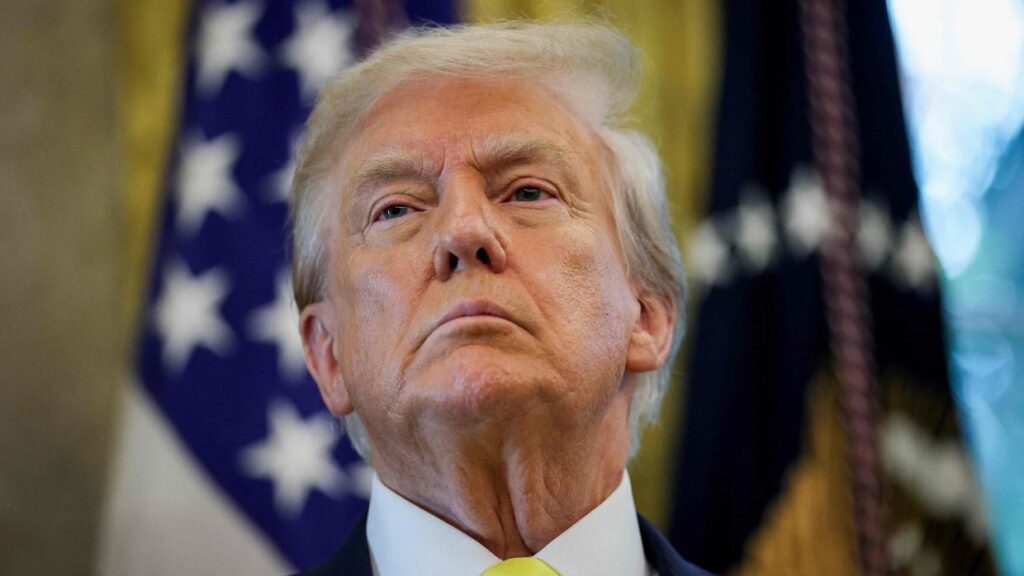In a development that has sent ripples through diplomatic circles, President Donald Trump’s administration has imposed a series of politically motivated sanctions against Brazil, a country that has long been considered a key ally in the Western Hemisphere. These sanctions, justified by the U.S. administration as necessary measures in response to Brazil’s domestic policies, have sparked a significant backlash from Brazilian leaders and have raised concerns about the potential erosion of a once-strong partnership between the two nations. As tensions simmer, analysts are closely monitoring how these actions will impact trade, political cooperation, and shared regional interests in a time marked by growing geopolitical challenges. This article delves into the implications of Trump’s sanctions on U.S.-Brazil relations, examining the historical context, the reactions from both governments, and the broader ramifications for international alliances.
Impact of Trump’s Sanctions on Brazilian Economy and Political Landscape
The recent sanctions imposed by the Trump administration have significantly impacted Brazil’s economic stability, creating ripple effects across various sectors. As the world’s ninth-largest economy, Brazil is now facing challenges that include reduced foreign investment, declining export opportunities, and heightened inflation. These sanctions have led to a devaluation of the Brazilian real, further straining the purchasing power of its citizens. Industries such as agriculture and manufacturing, which rely heavily on the U.S. market, have reported significant losses, exacerbating existing economic vulnerabilities.
Moreover, the political landscape in Brazil has been shaken, as the government grapples with the fallout of these sanctions. There have been calls for unity and resilience from various political factions, emphasizing the need for a cohesive response to counteract these adverse effects. Key challenges now facing Brazilian leadership include renegotiating trade agreements and strengthening ties with other international partners. Notably, a shift in diplomatic focus has emerged, with Brazil exploring trade flows with China and the European Union to mitigate the economic fallout. The outcome of this geopolitical tension will likely shape Brazil’s political dynamics for years to come.
Repercussions for U.S.-Brazil Relations Amidst Growing Tensions
As the United States seeks to assert its influence on the global stage, the imposition of sanctions on Brazil has sparked significant backlash, straining a relationship built on decades of mutual support and cooperation. Key areas of concern include economic collaboration, trade agreements, and environmental initiatives, which are now hanging in the balance. Should these tensions escalate, both nations could face repercussions that ripple far beyond their borders, potentially affecting regional stability in South America and altering geopolitical alliances. Industry leaders are already expressing apprehension that these sanctions could lead to diminished trade volumes and economic hardship for Brazilian exporters, further complicating matters between these traditional allies.
Amidst this backdrop, foreign policy analysts warn that the current hostility may hinder essential dialogues around pressing global issues such as climate change, public health, and a coordinated response to international trade challenges. Brazil, a key player in the Amazon rainforest’s preservation, may find itself sidelined as U.S. policies shift, potentially alienating other Latin American countries that depend on Brazil’s leadership. Potential impacts include:
- Reduced investment across multiple sectors
- Increased diplomatic isolation for Brazil
- A shift in regional alliances, favoring nations outside the U.S.-led orbit
Strategies for Repairing Diplomatic Ties between Washington and Brasília
In light of the recent sanctions imposed by the Trump administration, a multifaceted approach is essential for mending the frayed relations between Washington and Brasília. Diplomatic channels must be revitalized to foster open dialogue, allowing both nations to express mutual concerns and work towards common goals. Key strategies include:
- Engagement through Diplomacy: High-level diplomatic meetings should be prioritized to rebuild trust, with a focus on understanding each side’s perspectives.
- Trade Negotiations: Revitalizing trade agreements can bolster economic ties, ensuring both nations benefit from mutual economic growth.
- Cultural Exchange Programs: Promoting cultural understanding through educational exchanges and partnerships can enhance goodwill between citizens.
Additionally, collaboration on critical global issues such as climate change, public health, and security can serve as common ground for both countries. To facilitate cooperation, both governments may consider establishing a bilateral task force dedicated to addressing these shared challenges. A proposed template for this collaboration could involve:
| Focus Area | Potential Collaborations |
|---|---|
| Climate Change | Create joint initiatives for sustainable agriculture and renewable energy projects. |
| Public Health | Share research and resources for combating diseases that affect both populations. |
| Security | Enhance information sharing and joint operations against transnational threats. |
The Way Forward
In conclusion, the politically motivated sanctions imposed by former President Donald Trump on Brazil represent a significant shift in diplomatic relations that could have long-lasting implications for both countries. As old allies navigate this turbulent new landscape, the potential for economic and political fallout remains a pressing concern. Analysts emphasize the importance of restoring trust and cooperation among nations historically united by shared values and mutual interests. As Brazil reassesses its foreign policy and seeks new partnerships, the ripple effects of these sanctions will likely be felt across the region and beyond. Continued scrutiny of this evolving situation will be crucial as both nations work to mend their ties and chart a path forward in an increasingly complex global environment. For ongoing updates, stay tuned to WAVY.com.
